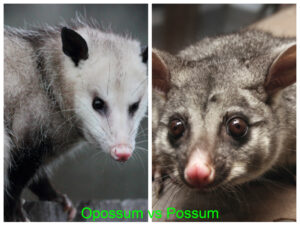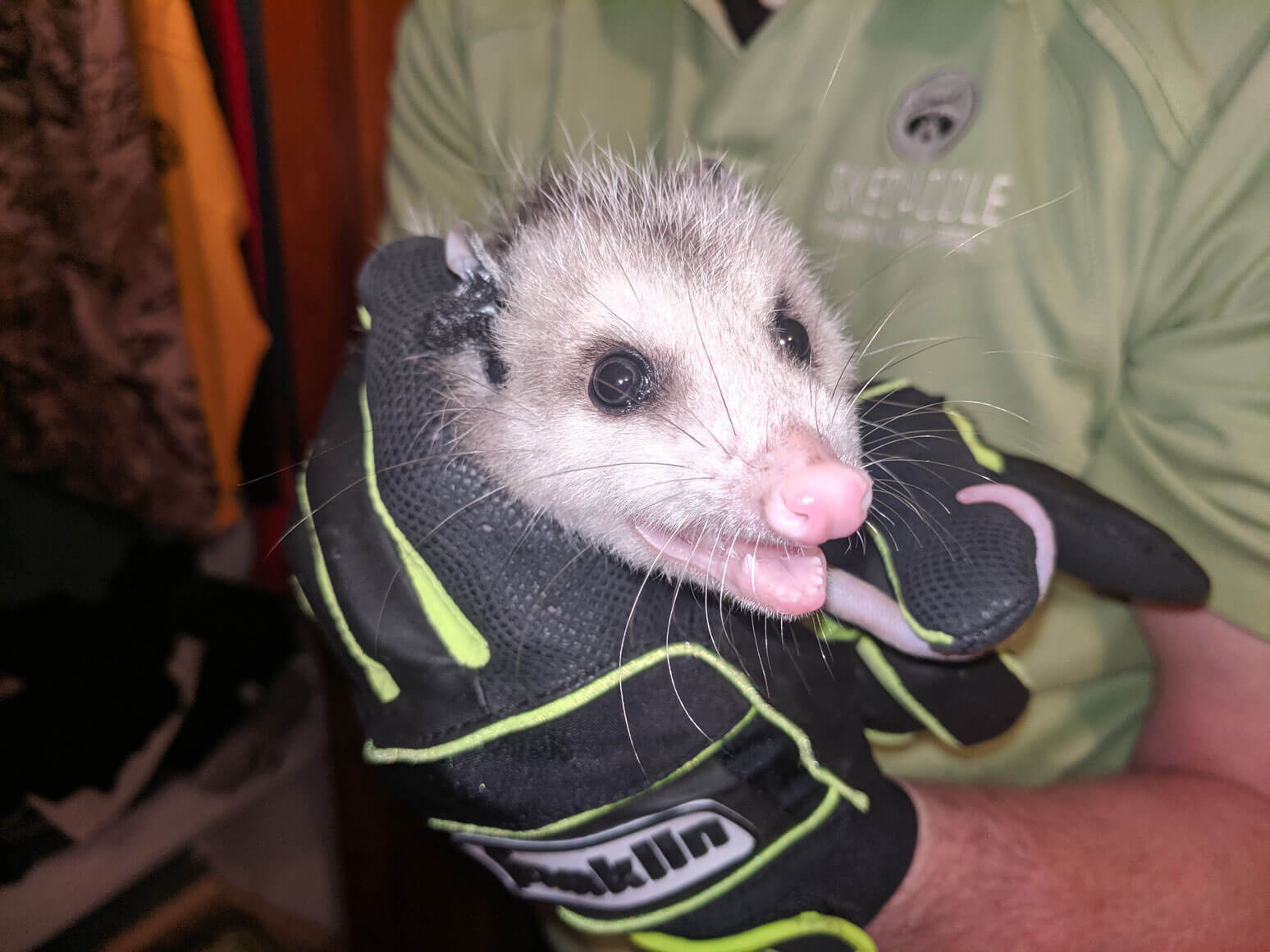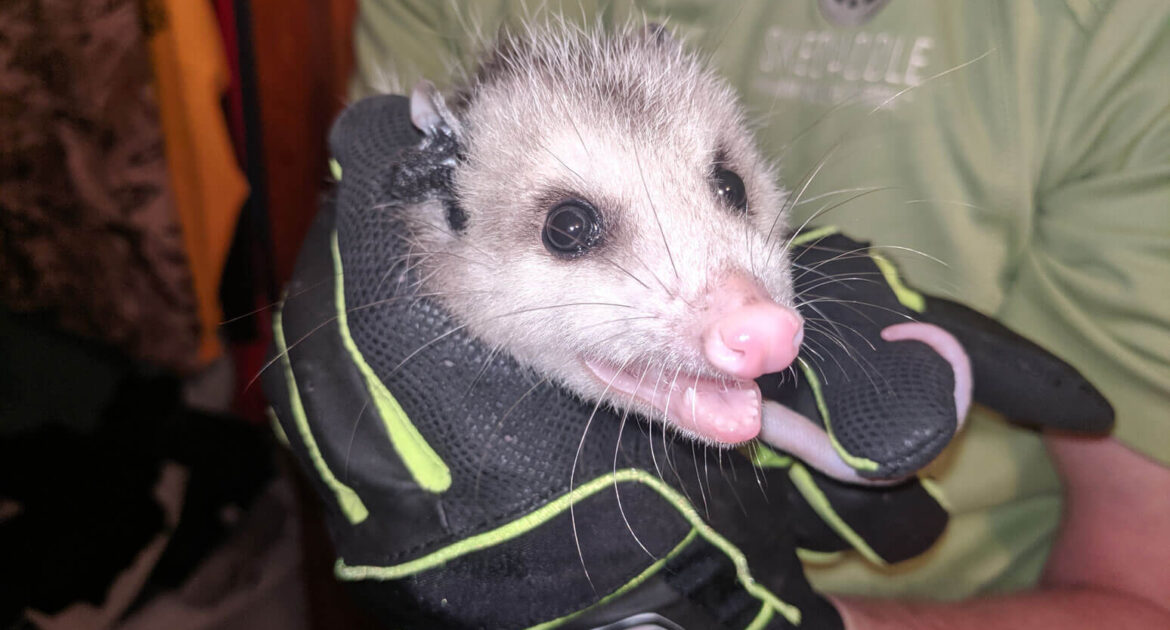Opossums are one of the most misunderstood mammals in America. They are often portrayed as not being the brightest or cleanest animals, but this could not be further from the truth. Opossums are smarter and cleaner than they are given credit for, but one common stereotype of this furry little scavenger is that they do play possum.
Why is the saying playing possum accurate?
“Believe it or not the saying playing opossum is pretty true.” That is according to Bill Dowd and he should know. As President and CEO of Skedaddle Humane Wildlife Control, he has more than 30 years’ experience in the wildlife control industry and has seen almost every animal trick in the book. Bills says, “Typically, opossums tend to sit and roll on their side and give off a foul odor. They show off their teeth, and since they actually have the most teeth out of any marsupial in North America, they look intimidating but if threatened they will play dead.”
Interestingly opossums don’t choose when to play dead. This is a defense mechanism and when an opossum experiences excessive fear it will seize up and fall onto the ground with its tongue lolling out and its eyes staring blankly into space. At the same time, they will emit a putrid odor, secreted from the anus, as a further deterrent for any predator that is thinking of making a meal out of the passed-out possum. A possum can stay in this comatose state for hours, but it is totally involuntary, and they can’t snap out if when they want to or as soon as the threat disappears.
This might be a great survival technique in the wild but with the right training, a professional wildlife control expert can walk up to a passed-out possum and pick it up safely with bite-proof gloves.
Are an opossum and a possum the same thing?

In America, the word opossum and possum refer to the same animal but in Australia, a possum is a totally different animal. The opossum and the possum are both small medium-sized marsupials, but the Australian possum looks like a cute mix between a chinchilla and a squirrel while the opossum found in North America resembles a fuzzy rat. There are over 60 different opossum species and they are widespread throughout the United States, but the most common one found in America is the Virginia opossum. Adult possums are nocturnal loners and they generally live in ready-made burrows, cavities or the abandoned dens of other animals. They will make themselves at home underground or in trees and pretty much anywhere in between that provides shelter and protection from predators.
What makes opossums special?
Opossums are the only marsupial or pouched mammal on the North American continent. A mother can give birth to up to 20 babies in a single litter, but not even half of these babies will survive to adulthood. Baby opossums are as tiny as bees and helpless when they are born, and they immediately crawl into their mother’s pouch and remain there as they continue to grow and develop. When the babies get bigger, they will crawl in and out of their mother’s pouch and can even be seen riding on their mother’s back while she scavenges for food.
Opossums have opposable thumbs and are incredibly dexterous. They use their long prehensile tail like an extra limb to hold onto branches and tree trunks or to carry grass and leaves to build a nest in a tree hole. They also use their tales for extra stability while negotiating the tree canopy. Their sharp claws are also great for digging into the bark of trees and this makes them master tree climbers. Opossums spend a lot of time in the treetops, but they do have to come down to hunt and scavenge for food. This means that they often cross paths with predators like dogs, cats, bobcats, and foxes and this is when they can usually be seen protecting themselves by playing possum.
Opossums are scavengers and they can survive almost anywhere on the North American continent. All they need to make themselves at home in an area is a source of water and food and a place to shelter. This means that they can adapt to life in both urban and rural areas but will often choose to live near people because where there are people, there is food. That is why opossums can often be seen scavenging in garbage cans and dumpsters or eating roadkill. In the wild, opossums will eat dead animals, but they also hunt mice, birds, snakes, and chickens as well as eating grass, nuts, fruits, insects, and worms. Basically, they will eat whatever they can catch or find. Interestingly, possums are immune to the venom of most snakes found in their natural habitat and they will see a snake as a meal rather than a threat. The exception is the coral snake.
Possums are not dirty disease-carrying animals
Because possums are natural scavengers and give off a disgusting smell when threatened, they are often portrayed as dirty animal’s, but this is in fact not true. Possums like to be clean and take grooming seriously. Like domestic cats, possums use their tongue and dexterous paws to make sure that they are clean and well-groomed. Possums are also not common carriers of the rabies virus. They are not immune to the disease but because, as marsupials, they have a lower body temperature than placental mammals they are not typically suitable hosts for rabies. Opossums also slow down the spread of Lyme disease by eating almost all the ticks that they find attached to their bodies. One opossum can eat up to 5000 ticks in a single season and this means that the more opossums you have in your area, the fewer ticks you will see.
They may not be as cute and cuddly as their Australian namesake or the most popular animal on the block, but the opossum deserves a place in your neighborhood. Possums are the garbage collectors of nature and play an important role in the environment and help maintain a healthy ecosystem. Not only do they eat a lot of ticks, but they also consume cockroaches, rats, mice and snakes and they should be appreciated by gardeners for helping get rid of slugs and snails. Being scavengers, opossums also do their bit to dispose of roadkill as well as overripe fruit and berries on the ground.
But while you may appreciate having opossums in your neighborhood, you do not want them in your home. If a possum moves in with you, your best course of action is to call in a wildlife control expert to remove and relocate your unwanted house guest.
At Skedaddle Humane Wildlife Control we have 30 years of experience dealing with all kinds of wildlife and our technicians are trained to safely and humanely remove possums from your home before they do too much damage. Once we have removed a possum from your property, we will do a thorough inspection of your home and block any entry points to prevent the opportunistic animals from returning.





